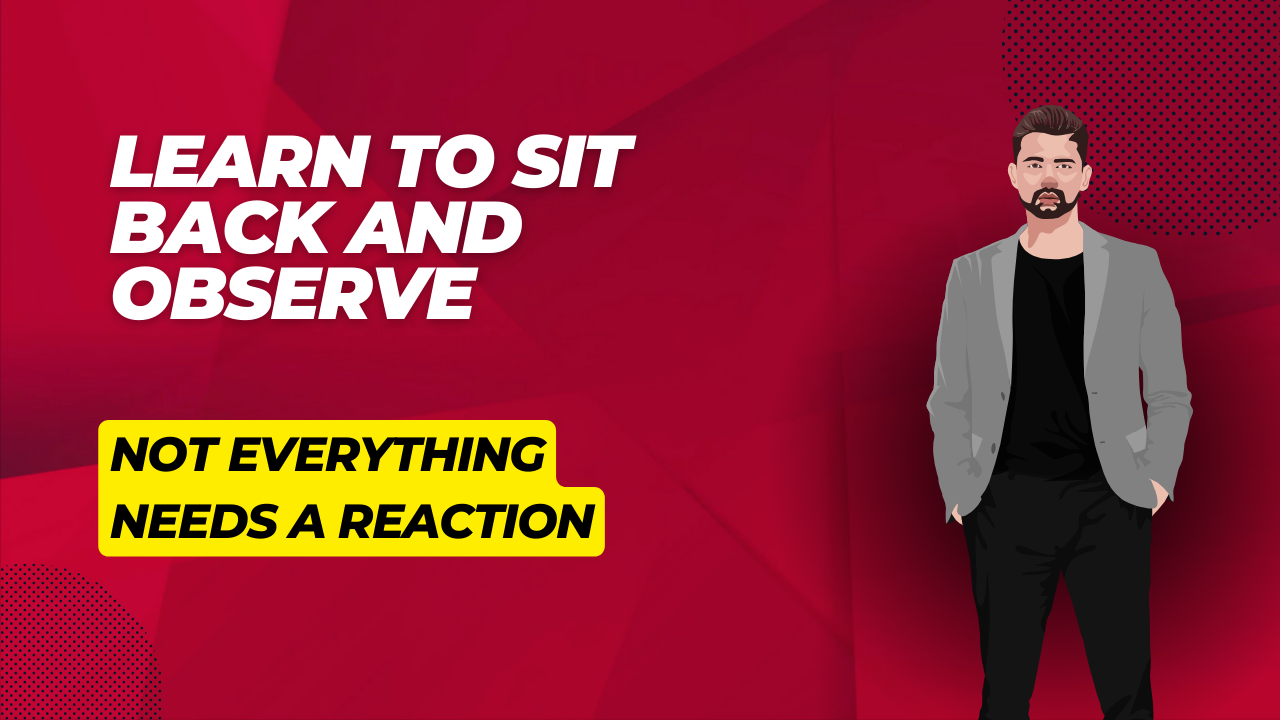You know how it is – something happens and you feel that knee-jerk reaction bubbling up inside. Whether it’s outrage on social media or just wanting to tell someone off, your first instinct is often to react. But what if you didn’t? What if instead of always reacting, you made a conscious effort to sit back, breathe, and just observe? It may sound counterintuitive, but learning to dial back the reaction and simply take things in can work wonders. In this article, we’ll explore the benefits of observing versus reacting to everything that comes your way. You’ll learn techniques to pause and consider if a reaction is needed or not. We’ll also discuss how sitting in observation mode can help you gain insights and new perspectives. So read on to find out how to stop being so reactive, and learn the power and peace that comes with taking a step back to simply observe.
The Urge to React to Everything (Learn to sit back and observe. Not everything needs a reaction – Tymoff)
In today’s fast-paced world, we feel forced to right away react to the whole lot. Our desire for consistent stimulation means we cannot take a seat nonetheless and actually take a look at it. We have an urge to love, remark and percentage on social media. We are obligated to respond to every e-mail and message at once. We can’t watch TV without also scrolling on our phones.
Slow Down and Observe
It’s critical to slow down and look at it. Resist the urge to react to the entirety and as an alternative take a seat, watch and pay attention. So a great deal can be won by being absolutely present in the moment. You’ll benefit from deeper know-how and new insights. You’ll lessen stress and tension. Your relationships will be advantageous as you provide people your complete attention.
Not Everything Requires a Reaction
The fact is, not the whole thing requires a direct response or reaction. It’s flawlessly first-rate to take a look at and replicate before acting. Take time to technique facts and decide if a reaction is even important. Often, issues will clear up themselves or the urgency will fade. What is regarded as important inside the warmness of the instant may additionally seem trivial after you’ve had time to study and evaluate.
Find the Pause Button
Train yourself to find the pause button. Take a deep breath and rely on 10 before reacting. Ask yourself if a response can wait. Determine if the difficulty will still seem essential the following day. Learn to distinguish between what deserves your intellectual and emotional energy and what you are better off ignoring.
Recommended: The best shows to watch on HBO Max
With practice, you could triumph over the urge to immediately react to the entirety. Learn the power of sitting again, looking at and letting a few moments spread without you entering. Your mind, frame and relationships will thank you.
Learn to sit back and observe. Not everything needs a reaction – Tymoff
Take a pause
In latest speedy-paced global, a lot of us feel forced to right away react to the whole thing we see or experience. We whip out our phones to tweet, submit or comment on events as they unfold. But continuously reacting in the second prevents us from certainly gazing and processing what is honestly going on.
Not everything requires your input
The truth is, no longer does everything in the world wish for your reaction or entrance. Many situations will spread just best without your statement. On some occasions are higher left without response. Making an addiction of pausing and observing without straight away reacting lets you gain treasured angles and perceptions.
You’ll gain a new viewpoint
When you sit down lower back and have a look at it without reacting, you may begin to notice new information you may have overlooked before. You’ll benefit from a deeper knowledge of the motivations and perspectives of others. You may additionally find your preliminary reactions and assumptions were off base. By pausing to have a look first, you can craft extra considerate responses and avoid escalating tensions or making situations worse.
Stay calm and thoughtful
Observing right away reacting also allows you to stay calm and reply in an extra considerate manner. Our preliminary reactions are regularly emotionally pushed, as opposed to logical or solution-centered. But when you deliver yourself area to the system what you’ve discovered, you may respond in a manner that is beneficial rather than truly reactive. You’ll communicate in an extra positive manner and build higher relationships.
Sitting back and looking at without response is a talent that takes practice to broaden. But making the effort to pause and recognize before responding can result in precious insights and a calmer, greater thoughtful outlook on the arena around you. Give yourself the gift of time and space to examine – your reactions may be wiser for it.
Why We Feel Compelled to React
As humans, we’ve an innate pressure to react to everything around us. Our brains are stressed to evaluate conditions and decide the proper reaction. The problem is, no longer the whole thing require a response, and reacting abruptly can often do more harm than top.
We Feel Threatened By Uncertainty
When we come across ambiguous or unexpected conditions, our brains perceive them as threatening. We react to attempt and reduce uncertainty and gain management over the state of affairs. However, reacting rapidly fails to recognize that not all uncertainty is terrible. Some conditions could benefit greater from remarks and persistence rather than impulsive reactions.
We Crave Stimulation
Our brains release dopamine, the “sense-correct” chemical, while we enjoy new and stimulating situations. Reacting rapidly, even to mundane events, gives us a dopamine raise. But reacting for the sole purpose of stimulation frequently does now not serve us well in the end. It ends in fatigue, strain, and wasted electricity.
We Seek Validation From Others
We often react with a purpose to gain validation and approval from the ones around us. We need to seem responsive, engaged, and on top of things. However, reacting basically for the advantage of others means we aren’t behaving authentically. It prevents us from figuring out an appropriate response based totally on our very own values and judgment.
Learning to sit return and examine, instead of robotically reacting, is an ability that takes conscious effort to develop. It requires recognizing that a response will not gain the situation and that patience and objectivity are maximum valuable. The more you practice watching earlier than reacting, the easier it becomes. Your interactions could be more real, your relationships will gain, and you will gain a sense of inner calm from the reduced impulsiveness. The potential to have a look at is a superpower well worth cultivating.
The Benefits of Sitting Back and Observing
Sitting again and observing as opposed to constantly reacting has numerous benefits. Improved emotional law. When you refrain from it without delay, you supply your feelings with time to relax. This can help prevent emotional outbursts and rash decisions you could later regret.
Gaining new views. By gazing at a scenario in preference to reacting to it, you open yourself as much to new ways of searching at matters. You may additionally be aware of information you missed in the heat of the instant, or see the alternative facet’s angle greater sincerely. New answers may additionally emerge that you didn’t consider earlier.
Reduced stress and anxiety. Constantly reacting places your mind and body in a state of alert, flooding you with strain hormones like cortisol. Sitting returned and gazing facilitates shift you right into an extra relaxed, contemplative country. Your respiration slows, your muscle tissues relax, and your thoughts open.
Better expertise. Observing is a way of amassing statistics. By watching and listening without judgment, you gain a deeper understanding of the humans and occasions around you. You choose up on diffused cues, see the larger image, and research things you can have ignored if you had been targeted on reacting.
Stronger relationships. When you refrain from steady reactions, you talk to others about what you believe them and give them an area to be themselves. You show which you are inclined to recognize instead of judge. This fosters a sense of connection and permits for deeper, extra meaningful relationships constructed on perception as opposed to impulse.
Sitting lower back and observing is a talent that takes exercise to broaden. But making the effort to sluggish down your reactions and spot the larger photograph can result in extra peace of thought, healthier relationships, and a more profound reference to yourself and the sector around you. With time and endurance, you may get higher at finding the nonetheless factor in which the statement starts.
How to Practice Mindful Observation
Spending time every day observing the sector around you without judgment is a skill that takes practice. Start through finding a cushty spot free of distraction and focus on your senses.
Notice the little details
Really take a look at the objects and scenes in front of you. Appreciate colourations, shapes, shadows, and textures with a newbie’s thoughts. For example, in case you’re out of doors, observe the veins within the leaves on timber, the sample of petals on a flower, and the manner sunlight filters through the cover above. Listen for sounds you frequently tune out like birds chirping, the wind rustling, or a clock ticking.
Avoid labelling and interpreting
As you look at the arena around you, avoid putting labels on matters or deciphering what you notice and hear. Just notice the info as they’re. For instance, in preference to labelling a flower as a “tulip” or pronouncing the sound you hear as a “vehicle door slamming”, awareness simplest on its attributes like the pointed crimson petals you see or the loud metallic-on-metal bang you pay attention to.
Breathe and be present
Remember to respire fully and slowly as you examine. Follow your breath shifting inside and outside to assist anchor you in the gift second. Let your mind come and pass without judgment and lightly convey your focus back to your senses each time your thoughts wander.
Start with a short time
Even starting with simply 5 or 10 minutes a day of conscious commentary can assist and give a boost to your ability to recognise and be present. You can do it anywhere — in your outdoors, at a park, or maybe looking out the window. Set a timer so you do not need to maintain checking the clock.
With regular practice, mindful observation can turn out to be second nature and help reduce stress and boost your appreciation of the simple information in ordinary lifestyles. Be an affected person and be non-judgmental with yourself as you build this ability.
Developing Your Inner Observer
To come to be higher at sitting lower back and looking instead of reacting, you need to broaden your “inner observer.” This is the part of you which can watch conditions spread with calm detachment and spot things for what they actually are.
Quiet Your Mind
The first step is mastering how to quiet your thoughts. Our minds are constantly chattering, judging, and reacting. Take a while every day to sit down in silence. Start with simply 5 or 10 minutes a day of meditation or deep breathing. This enables you advantage in recognition of your thoughts and learns to now not get stuck up in them.
Look for the Facts
Rather than making assumptions or inferences about a state of affairs, search for objective facts. What do you certainly know, see, or hear? Stick to concrete proof in place of speculating. This additionally way warding off labelling people or their behaviors in a judgmental manner. Describe best actions and activities, no longer personalities or presumed intentions.
See the Bigger Picture
Try to look beyond the floor details of an unmarried moment. Look for the bigger styles, dynamics, and cycles happening. How has this example evolved through the years? What broader factors may be influencing things? Looking at the bigger image allows you to understand that most things are complicated, as opposed to simplistic or black-and-white.
Withhold Judgment
The most important skill of an observer is withholding judgment. Avoid criticism, blame, and knee-jerk critiques. React much less and replicate more. Look with an open mind and heart, seeking to understand instead of skip instantaneous judgment. Judging less results in greater clarity, information, and compassion.
Developing those observer competencies takes practice. But with everyday effort, you can learn to sit down return and spot lifestyles spread with extra grace, insight, and staying power. You’ll react much less and understand extra, gaining a calmer angle and a smarter method to reports. This inner observer can guide you to higher responses and assist create healthier relationships and interactions with the world around you.
Beyond the Basics: Deepening Your Observational Skills
To become a master observer, you need to go beyond just watching what’s happening on the surface. Train yourself to notice subtle details and look for deeper insights.
Look for patterns
As you observe a situation, look for patterns in people’s behaviour, relationships, and communication. How do certain individuals interact with each other? Are there power dynamics at play? Recognizing these patterns can reveal a lot about the underlying dynamics.
Pay attention to body language and tone.
The way people say something is just as important as what they actually say. Notice people’s posture, hand gestures, eye contact, and facial expressions. Listen for subtle tones of voice like sarcasm or hesitation. These nonverbal cues often communicate what people are really thinking or feeling.
Look at the whole context.
Don’t just focus on individuals – look at the surrounding environment and overall context. Think about how the physical space, group dynamics, and outside circumstances might be influencing people and events. The context often provides meaning and helps you understand why people are acting or communicating in a particular way.
Question your assumptions.
As observers, we naturally bring certain biases and assumptions to our interpretations. Make an effort to question those assumptions and consider alternative explanations. Just because something seems obvious doesn’t mean your initial impression is accurate. Look for evidence that contradicts your views and be open to revising them.
Reflect on your reactions.
Pay attention not just to what you’re observing in the outside world but also to what’s going on inside you. Notice how certain situations or individuals trigger emotional reactions like discomfort, anger or empathy. Your reactions often point to deeper insights and can reveal as much about you as the people you’re observing. Make it a practice to reflect on these reactions and how they shape your perceptions.
With regular practice, these deeper observational skills will become second nature. You’ll find yourself gaining valuable insights into human behaviour that others often miss. And you’ll navigate relationships and situations with more wisdom and understanding.
Not Reacting – Frequently Asked Questions
When you first start practising non-reaction, you may have some questions about how it works and what it really means. Here are some common FAQs to help clarify things.
Not reacting means consciously choosing not to respond emotionally or impulsively to situations that would normally provoke you. Instead, you remain calm and thoughtful. This allows you to respond in a more constructive way. Some people also call this “keeping your cool” or “staying level-headed.”
Do I have to not react to everything? No, that’s not realistic. The goal is to improve your ability to stay calm and think before reacting to stressful situations. Start with the small stuff, like not getting frustrated in traffic or upset over little annoyances. As you practice, you’ll get better at applying it to bigger issues.
What if not reacting makes me seem unemotional or detached? Non-reaction is about controlling your responses, not eliminating your emotions. You can still express empathy or concern, just do so in a thoughtful, composed way. Stay engaged in the conversation or situation. Non-reaction is an internal state that allows you to choose a constructive outward response.
Isn’t it unhealthy to bottle up my feelings? Bottling up emotions refers to repressing how you feel and can indeed be unhealthy. Non-reaction is different. You acknowledge your feelings but choose to respond in a calm, deliberate manner. You are still in touch with your emotions, but you do not let them dictate your actions. This ability to experience emotions without being overwhelmed by them is a sign of emotional maturity.
With regular practice of non-reaction, these techniques will become second nature. You’ll get better at pressing pause, keeping your cool in the heat of the moment, and choosing responses that you feel good about after the fact. Stay patient and remember, that the ability to remain calm under pressure is a skill that will serve you well for life.
Conclusion
So remember, my friend, sometimes the wisest move is no move at all. Just sit back, breathe deeply, and observe without reacting. Let things unfold as they will. You’ll gain insight into people and situations that constant intervention won’t provide. And you’ll avoid wasted effort and energy on matters that never needed your input. Of course, discernment is key – know when action is required. But often, we simply must let life happen as it happens. The art is recognizing when to act and when to let be. With practice, you’ll get better at telling the difference. For now, try to worry less and watch more. Detach a bit and see what comes. You might be surprised at what you discover.



